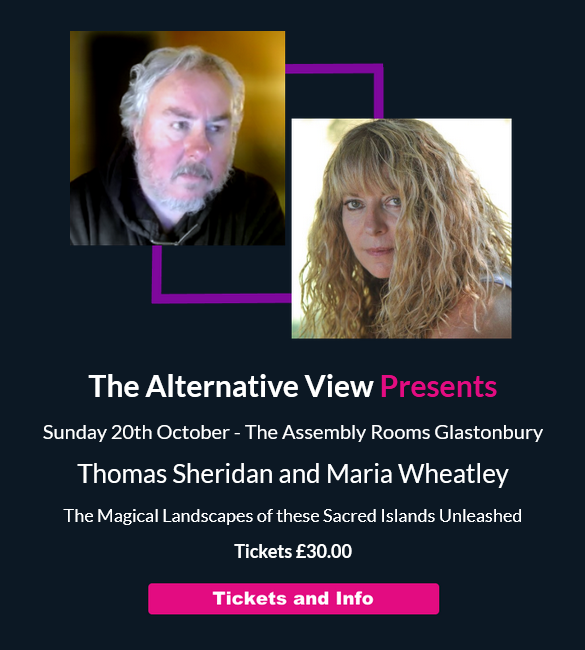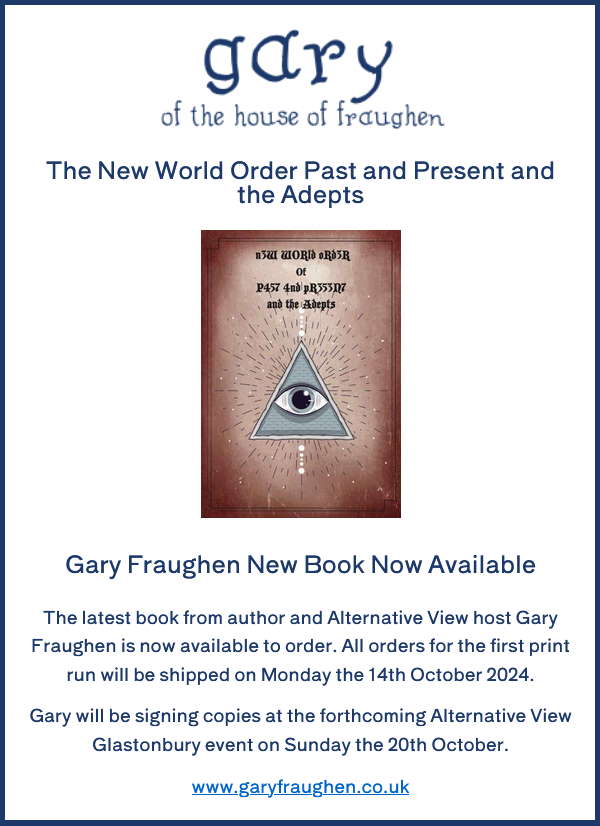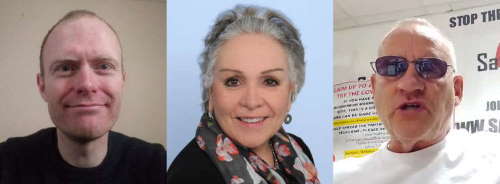Euthanasia a posh word for state sponsored murder
Sat 5:32 pm +01:00, 19 Oct 2024 1In countries where euthanasia has been introduced it is not just the sick and the terminally ill who are being killed.
Dr. Vernon Coleman: This Affects You and Everyone You Love
Euthanasia is going to be debated in the British Parliament in November.
Pressure groups, manipulators and conspirators want euthanasia to be legal everywhere in the world…
| |
| |||||||||||||||
Euthanasia is going to be debated in the British Parliament in November. Pressure groups, manipulators and conspirators want euthanasia to be legal everywhere in the world because they see it as a great way to reduce the size of the global population and to cut the cost of providing care and support for the elderly, the sick, the disabled and the poor.
Do not be fooled into thinking that a change in the law will be to help terminally ill patients. If a euthanasia bill is brought in it will be to help the conspirators who are promoting net zero and the great reset.
MPs will argue that all terminally ill patients who have less than six months to live should be allowed to decide to die. Doctors with practical experience in medical practice know that this is nonsense. No doctor can ever say with a certainty that a patient has only 3, 6, 9, 12 or 36 months to live. I have known patients who were told that they were terminally ill but who lived for many years afterwards. Doctors are often wrong when making diagnoses and nearly always wrong when making predictions.
In countries where euthanasia has been introduced it is not just the sick and the terminally ill who are being killed.
People are being legally killed because they are depressed, frail, poor or unemployed.
And despite the claims being made, euthanasia is not painless, it is not peaceful and it is not dignified.
The bottom line is that euthanasia is being introduced to save money and to kill people who need health care and support.
In order to help promote euthanasia, palliative services are deliberately being drastically reduced with the result that patients in pain will be eager to allow themselves to be killed. Health care for those who are sick are also being drastically reduced. People do not have to suffer unbearable pain when terminally ill if they receive good palliative care but, sadly, people are being made to suffer unnecessarily to force them into euthanasia.
There are many people who argue that euthanasia should be made available so that those who are suffering have a choice about whether or not they wish to end their lives, but that is not the point of my campaign against euthanasia. General health care, mental health care, palliative care, hospice care are all being deliberately reduced around the world to force people into signing up for euthanasia. This could one day affect you or the people you love. Once euthanasia has been introduced into the UK, it will not be very long before people will be denied the choice of whether or not they live or die. People in other countries where euthanasia has been introduced, are automatically advised to opt for euthanasia rather than be given the medical help they need.
Here are some case histories which might help you decide whether or not you approve of euthanasia:
Shocking Case Histories
Christine Gauthier, a former member of the Canadian military who injured her back in a 1989 training accident and who competed for Canada at the 2016 Rio de Janeiro Paralympics, needed a wheelchair ramp in her home. She’d been trying to get the ramp for five years. The caseworker who responded offered her a medical assisted death (the Canadian version of euthanasia is known as MAID) and offered to provide the equipment. The Veterans Minister, Lawrence MacAulay later revealed that at least four other Canadian military veterans had been offered a medically assisted death. He added that a veterans’ service agent had been suspended.
Kathrin Mentler, a 37-year-old counselling student went to the Vancouver General Hospital for help with her debilitating feelings of depression and hopelessness. The staff member she saw told that psychiatrists were in short supply. ‘Have you considered MAID?’ she was asked. The clinician who made this bizarre and inappropriate offer said that overdosing at home could lead to brain damage whereas a state-administered MAID death would be more comfortable. A Vancouver Coastal Health spokesman, Jeremy Deutsch, said that the hospital had followed protocols.
A 61-year-old woman suffered from depression after a concussion sustained in a car crash. She was offered, and accepted, death by doctor as an alternative to treatment. The woman’s daughters later requested an investigation, saying that their mother should not have been offered death because of her mental health troubles. The police investigation concluded with no arrests.
An unnamed Canadian Forces veteran suffering from PTSD was told that he could opt for a medically assisted death. Family members said that the veteran felt betrayed and that the offer had derailed his recovery.
A man with a degenerative brain disorder, was offered euthanasia so often that he began recording hospital staff. In one recording, a hospital ethicist told the man that his care was costing the hospital ‘north of $1,500 a day’ and asked if he had ‘an interest in assisted dying’.
A woman took her daughter to a hospital emergency room in Newfoundland. Unprompted, the doctor informed the woman that her 25-year-old daughter, who has cerebral palsy and spinal bifida, was a good candidate for euthanasia. When the offer was rejected, the doctor told her that not taking up the State’s kind offer to kill her daughter would be selfish.
A woman called Sophia who was living on disability payments and who had failed to obtain affordable housing ended her life under Canada’s assisted-suicide laws. ‘The Government sees me as expendable trash, a complainer, useless and a pain in the ass,’ she said after she and friends had pleaded without success for better living conditions.
I could go on. But you get the picture. Armed forces veterans and prisoners are not infrequently offered euthanasia. If this law comes in then anyone who is disabled, poor or ill may be offered death instead of medicine.
The Myth of a Painless Death
It is a convenient myth (convenient for the proponents of euthanasia) that euthanasia (in its various forms and incarnations) is painless and dignified.
There is absolutely no evidence to show that it is either.
But there is plenty of evidence to show that it is neither.
Euthanasia does not provide the painless, peaceful death which its advocates claim it to be. There is no perfect way for the government to kill people. As Samuel Beckett said: ‘Even death is unreliable’.
A study in the journal ‘Anesthesia’ reported that there were no standardised methods for euthanasia and so, as a result, there are frequent cases of prolonged and distressing deaths. There appears to be a high incidence of vomiting, re-awakening from coma and prolongation of the dying process (with some individuals taking up to seven days to die.)
A study performed in the Netherlands showed that in 21 of 114 cases, the patient did not die as soon as expected or woke up and the doctor had to kill them for a second time.
Dr Joel Zivot, an anesthesiologist and critical care doctor, has suggested that death by euthanasia could feel like drowning. If paralysing drugs are used, the patient appears calm, peaceful and quiet – but that doesn’t tell us what the patient is experiencing.
Experts fear that patients being killed may suffer intolerable, unbearable physical or psychological pain.
In Belgium, the relatives of a 36-year-old woman heard screams when she was supposedly being euthanized. A post mortem showed that the woman had been suffocated with a pillow after the drugs failed to kill her.
An elderly, demented woman in Belgium was euthanized after her family decided that she should be killed. Since it was claimed that the woman didn’t understand what was happening, the doctor laced her coffee with her sedatives – while she was chatting with her family. The doctor then gave another sedative by injection. The woman then stood up. Family members held her down while the doctor injected her and killed her. In court later the judges declared that ‘given the deeply demented condition of the patient, the doctor did not need to verify her wish for euthanasia.’ (I find it difficult to understand how this death could be described as euthanasia.)
Complications which have been recorded during euthanasia include: difficulty in finding a vein, spasms, twitching, nausea, vomiting, tachycardia, sweating, gasping. One instance of euthanasia failed because the doctor had ordered the wrong drug. Another attempt was delayed when the doctor had to leave to fetch a second batch of lethal drugs.
Taking lethal drugs by mouth can be traumatic. It is not unusual for patients to take many hours to die. One patient took 104 hours to die. One patient became unconscious 25 minutes after swallowing lethal medication but woke up and regained consciousness 65 hours later.
It’s All About the Money
The euthanasia scam is being sold as an exercise in kindness.
This is what the euthanasia supporters say: ‘The good news is that we can help you avoid pain and distress and save your family from the agony of seeing you decline slowly. By helping you to commit suicide, we bypass all that pain and take you straight to the closing credits.’
That’s all nonsense, I’m afraid.
Euthanasia is all about money. It has been established that the average annual health care cost per person for individuals in their last year of life is 14 times as high as for those not in their last year of life.
As a result, money is being diverted from health care and palliative care into ‘Voluntary Assisted Dying’ programmes (also known as ‘state sponsored deaths’) which are designed to cut health care costs. It is a lot cheaper to kill people than it is to provide palliative care.
And, even more significantly, euthanasia programmes are being introduced in order to cut pension costs.
It is no secret that all developed countries are facing huge pension problems.
Many of those who receive State pensions believe (quite erroneously) that the money they have paid in taxes has been put aside to pay their pensions. In reality, of course, pension programmes are simply huge Ponzi schemes. The State pensions which are being paid today are paid out of today’s taxes. And, in twenty years’ time, the pensions which are paid out will be paid out of the taxes which are paid by workers in twenty years’ time. If the size of the aged population can be cut, the annual savings will be measured in billions of dollars.
After thousands of elderly people were murdered in hospitals and care homes during the lockdowns, politicians boasted with glee that the financial savings, in unpaid pensions, would be huge. The more people they kill, the more money they’ll save. Britain’s Labour Party has cancelled winter fuel payments to pensioners despite knowing that the decision will result in tens of thousands of deaths.
Let us all be honest about it: the pro-euthanasia programme is nothing to do with people’s rights or with reducing pain or distress: it is, inevitably perhaps, all about money.
Death is now seen as a viable alternative to costly and inevitably futile medical treatment.
A paper which appeared in the Canadian Medical Journal drew attention to this possibility very vividly. The authors concluded that Medically Assisted Death could reduce annual health spending by between $34.7 million and $136.8 million. (I always find it difficult to have any respect when such a wide range is offered. It suggests to me that the figures are no more than a guess.)
Moreover, it was pointed out that these savings would outweigh the estimated cost of implementing medically assisted dying by a considerable sum.
Naturally, the authors of the report stressed that saving money should not be a consideration when considering whether a patient should live or die. But I am not the only observer to fear that this was merely an attempt to avoid official responsibility for the endless series of dilemmas which will now ensue and which will, I fear, be decided by people who are not unduly troubled by ethical niceties.
If the State wants a cull of the disabled, the incompetent, the frail, the elderly and the mentally ill then the State will have no difficulty in finding the people prepared to provide the cull.
Long waiting lists (getting longer in Canada as everywhere else), the effective rationing of medical services (with many operations only available for those who can pay privately) will mean that the pressure to execute euthanasia programmes on a wide scale will probably be well supported by the general public.
Suggesting that doctors and bureaucrats should not take financial problems into account is at best naïve and cynical. Doctors and bureaucrats already take cost into account, and it is now common for life-saving drugs to be unused simply because they cost too much.
The reality is that euthanasia is largely about saving money.
The slippery slope that campaigners have been warning about is very real. And we are already part of the way down the slope and we are moving faster down the slope each day.
The disabled and the elderly are now widely regarded as of little or no financial value.
Money has always had a much bigger effect on health and social care policies than is generally accepted. For example, in Britain, long stay residential homes for the mentally ill were closed because of political correctness. The result was that countless thousands of individuals who could not look after themselves were thrown out into the ‘community’. A lack of services and help means that these unhappy souls now spend their days sitting in parks and bus shelters. They would spend their days in the public libraries except that there aren’t many of those anymore. In reality, of course, this had nothing to do with political correctness. It was all about the money that could be saved.
PLEASE HELP US STOP THIS EVIL PLAN
If you want to stop this awful plan please share article or watch and share Vernon Coleman’s video entitled `They want to kill you. Here’s how they’ll do it.’ Just CLICK HERE As you probably know Vernon is banned from all mainstream and online media except for his website. Please help by putting a link on your Facebook account or on other social media platforms. Share the video as widely as you can. Put the video up on Bitchute, Rumble, Odysee and even YouTube, etc. Send the video (or copy and paste this article and email it) to politicians, journalists, radio and TV presenters, etc. It will soon be too late – and I suspect it will soon be illegal to criticise euthanasia. And please read and share Jack King’s book entitled `They want to kill us’. CLICK HERE to buy a copy. Jack King has offered to debate euthanasia on numerous network radio stations – but no one will allow him to speak. Once again, it seems that debate and discussion are banned. You are the only hope of stopping euthanasia. If you do not trust politicians then you should not support euthanasia. If you do not trust the State then you should not support euthanasia. And remember: if euthanasia is made legal then the law will never be repealed.
Copyright Vernon Coleman and Jack King October 2024

















Distressing to say the least Henry.